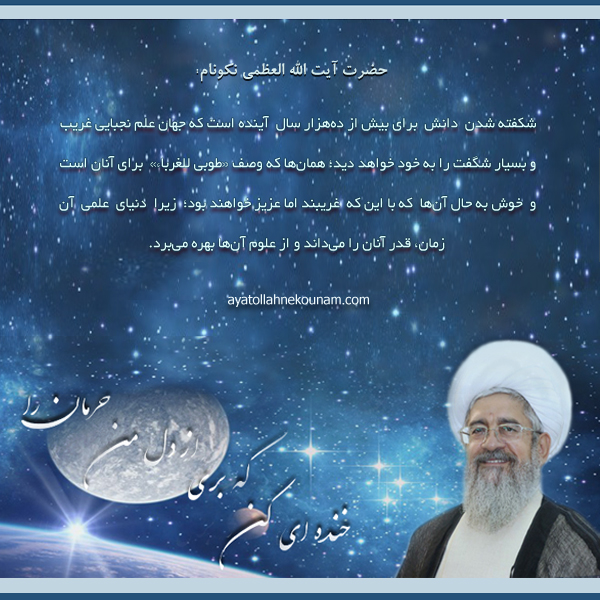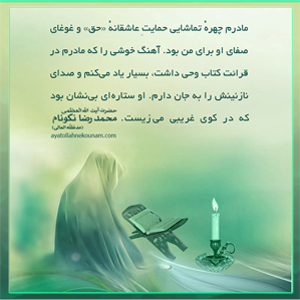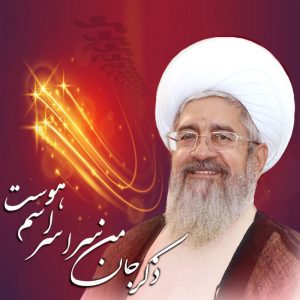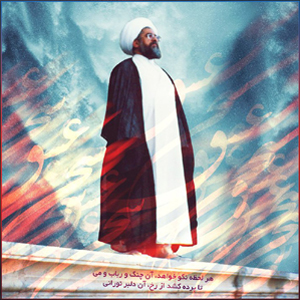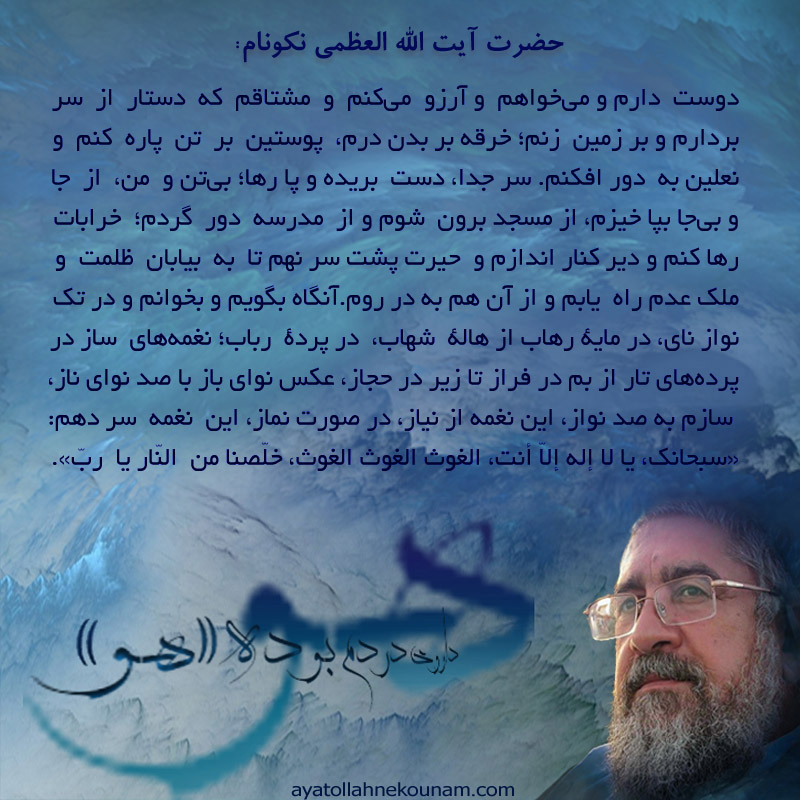Who is Ayatollah Nekounam?
Some of Ayatollah Nekounam’s Published Works
Grand Ayatollah Mohammad Reza Nekoonam ( (born 1948):
is an Iranian Twelver Shi’a Marja. He has studied in seminaries of Qom, Iran under Grand Ayatollah Mohammad Reza Golpaygani, Mohammad Ali Araki, Sheykh Morteza Haere, Mirza Hashem Amoli, Seyyed Ahmad Khansari, Milani, Adib Neyshabori, Allameh Muhammad Husayn Tabatabaei, Allameh Sha’rani and Allameh Elahi Ghomshei. What distinguishes him from other Ayatollahs and A’lims is his endeavor an hard, indefatigable uninterrupted efforts to wash away the dust of superstition and false ornaments off the surface of “True Islam” so that the jewel inside would glitter and radiate the light that could illuminate man’s dark, gloomy world of ignorance and confusion. The true Islam that is based on logic, reason, thinking, contemplation and understanding not what is introduced to the world as the religion of superstition, ignorance, dogmatism, extremism and fundamentalism. A functional religion that has rules and regulations for every aspects and situations of human life, regardless of their time, age, place, race, nationality and all other borders to divide ‘sons of Adam’!
This weblog would try to help others to get to know Ayatollah Nekounam’s thoughts and teachings to let others know what the ‘True Islam’ is like!
His Lectures and Teachings in Hawza
Ayatollah Nekounam has been teaching in Hawza for almost 40 years in different fields from the Islamic philosophy, mysticism, Fiqh (Islamic jurisprudence) and Tafsir (exegesis) to ethics, aesthetics and art, anthropology and epistemology.
Some of these courses are put down and published and most of them are available in audio format, prepared for the public to get the opportunity to use these unique and precious knowledge and information which have always been kept and discussed only in the corners of the Hawza, and specified for the Hawza students, get the opportunity once in a lifetime to be publicized and discussed in large scales.
In his teachings as well as his books, that are based on his doctrine, he is trying to prove that both the religion and mysticism are logical.
According to his ideas, which are at times unprecedented, without ‘reasoning’ and the ‘power of reason’ no prophet would be accepted by the people and no religion would be formed. By glorifying wisdom and reason, he rejects those who claim ‘the incompatibility of religion and science’ or those who call their misanthropic, cynical and antisocial life of hermitage and isolation, ‘mysticism’ or ‘ Sufism’.
He strongly believes that religions are there to make life easier and better for us, and that what is shown and practiced today as ‘religions’ is to a greater extent nothing but frill and is far beyond the pure message of the prophets who brought them to the people.
By his logical and crystal clear fatwas, he seeks to make religion practical and up to date rather than something old-fashioned and complicated.
It is why in his fatwas he clearly states that some of the controversial matters such as music and some games such as chess ARE halal.’Open your minds and let people free to enjoy and have fun’ he implores the ulama to show more understanding for the people.
The Resurrection of the Body
The resurrection and its nature, especially the resurrection of the body, is one of the most complicated and technical problems which has long urged the Islamic philosophers and scholars into deep contemplations. A wise genius like Avicenna excludes the topic of resurrection from the realm of the logical analysis and intellectual study and considers it to be a subject beyond the boundaries of wisdom. We can claim that according to him this topic is arational rather than irrational. Many philosophers, namely Molla Sadra, and the scholars following him, sought to rationalize this very issue, by fabricating a theory to support it; however, none succeeded to reach at a convincing result.
Through studying and finding the historical backgrounds of this topic, the present book reviews the ideas of the theologians, philosophers, mystics and the commentators of the Qur’an on the subject, and conducts a comprehensive study of the Qur’anic conception on the matter and; eventually, presents an exceptional viewpoint, and by scrutinizing the very basics and principles of the subject, arrives at some very new and fresh conclusions.
The Knowledge of the Spiritual Wayfaring
The “practical mysticism” is a complicated, yet practical knowledge which embraces much of the richest components of the Shiite culture. This knowledge could be found in other cultures as well and each single culture has some traces of this very knowledge; however, with lots of misunderstanding and diversions. In Shi’a Islam, the knowledge of the spiritual wayfaring (soluk) has never been scientifically revised.
The practical mysticism has the intention to lead the one with the spiritual talent for this path (solu) into the realm of the heart, to gain the knowledge of the Unseen, and to meet with the esoteric truth of the existence. This journey, in the Shiite culture, has a specific path.
The author in this book, by presenting and engineering ‘the knowledge of the practical mysticism’, for the first time ever, based on the School of the Household of the Prophet, clarifies all the principles and rules needed for a gifted person with spiritual talents to reach the realm of the Unseen and the spiritual world.
Dare to Question
One of the main principles in all his teachings and studies is that : “We have to stop canonizing the outstanding figures of our history.” He believes by idolizing the giants of the Islamic science, fiqh, mysticism and alike, we feel ourselves so much under their spell and power that we fail to see the deficiencies and problems in their ideas and theories.
However, if we approach them with open eyes, beyond owe and blind admiration, we can learn from what is right and appropriate in their thoughts, correct them where they are wrong and put aside what is old-fashioned and out of date in their theories.
We have to have the audacity to face these prominent figures directly and dare to put their ideas under question while learning from them. For no matter how great and knowledgeable they were, as human beings, they had for sure their own shortcomings and mistakes that should not be overshadowed by their grandeur and fame.
Let People Free
He strongly believes that religions are there to make life easier and better for us, and that what is shown and practiced today as ‘religions’ is to a greater extent nothing but frill and is far beyond the pure message of the prophets who brought them to the people.
By his logical and crystal clear fatwas, he seeks to make religion practical and up to date rather than something old-fashioned and complicated.
It is why in his fatwas he clearly states that some of the controversial matters such as music and some games such as chess ARE halal.’Open your minds and let people free to enjoy and have fun’ he implores the ulama to show more understanding for the people.
The Pulsation of Belief and Disbelief
The present book is trying to correctly define the words ‘belief’ and ‘disbelief’; so that by doing so, the spiritual and religious culture of the society would get rid of its current state of decline and passivity, and is also seeking to study and analyze, as the first step, the terms ‘belief’ and ‘disbelief’, dubbed as ‘expansion’ and ‘contraction’ by the author, and find the due nature and essence of them.
The Creation of Man and Materialism
Man has always been endeavoring to get a better knowledge of himself and to get a more accurate understanding of the world in and outside him and the hidden aspects of his soul and body. There has been a lot of philosophical thinking and reflections and experimental efforts in the area and all the studies concerning human nature have brought about various schools and ideologies, among which, in our time and era, the materialistic approach stands out.
Through briefly studying the materialistic approach to man, the present book is trying to philosophically analyze and criticize this school of thought. The subject of man’s creation is also a topic that has challenged the researchers for years, among which the Darwinian Theory got fame and prestige. This very subject is also scientifically and philosophically analyzed in this book.
The Trumpet of Love
Mysticism is a profound yet simple and beautiful world whose essence is ‘love’ and its medium is ‘poetry’- which is a translation of love into human language, especially the sweet Persian language for having the necessary cognitive, scientific and emotional terms and words that can best handle this very important task.
After presenting the poetry collection of the author, the present book has a glance at the nature of mysticism and some of the most important subjects on ma’rifa (knowledge) and numerates the levels of tawhid (monotheism) namely the collective monotheism and the personal oneness of existence (wahdat al-wudjud) and endoses the luminosity and guardianship (wilaya) of the Household of the Prophet (Ahl al-Bayt ) and introduces his special method for taking the path of suluk.
In this book the author also tries to hint some of the problems found in the mystical poetry collections namely the Diwan of Hafiz.
Life; Fountain by Fountain
By presenting and helping to reach at four hundred and four boiling fountains, this book is seeking to provide its readers with the water of the perpetual and eternal life which is based on the worldly health and the eternal otherworldly bliss. The fountains that talk about the monotheistic ideology, and show the way of the right Devine servitude, devotion and monotheistic worship, and clarify some of the Qur’anic mysteries.
The present book also talks about ‘dikr’, mentions the value of the world and studies man (the knowledge pertaining to man) fountain after fountain, and provides the reader with a glance at the meadow of the paranormal phenomena. It depicts the magnitude and the different ranking of the universal phenomena. Also some of its fountains portray, frame after frame, the death, moment of death, the purgatory, and the Day of Judgment.
Another part of this book teaches the rules to best conduct people, and mentions some basic principles regarding different areas; from the social relations and wife and children treatment and house and food management, to the behavioral vices and virtues and the required educational system.
God I Worship
In the book entitled ‘God I Worship’ the author admits the fact that man’s mind with all its vastness and immensity is not at all a proper place for the Divine to manifest itself. This could be done at the level of the heart alone. This is only the heart that can enter the Divine realm and have proximity with God. In spite of being an expert in the fields of philosophy and theology, the author believes, all the theological and philosophical discussions over God’s existence or non-existence are just meaningless and absurd; for God could never be conceived by the power of the logic and reasoning.
Man’s heart is where He dwells!
In this book, it is tried to depict the God of mercy, love and compassion who is attainable and at hand if only we knew the ‘right path’ to Him; which goes through the heart not the mind, contrary to what the theologians and philosophers claim.
Irfan
According to Ayatollah Nekounam’s ideology, the most straightforward path to reach perfection and the best way of Solouk (spiritual journey), which is to him the easiest and the shortest one, is ‘to renounce all sorts of avarice and greed’; in regard to God, to oneself or to people. That is to say; we should not love and glorify God just because he is of higher power or that he is the one who sustains us , or having this in mind that by getting closer to him we would gain the ‘Kingdom of Heaven or Earth’. We should love Him and Him alone. Much the same way, we should not have any intention in mind, good or evil, when we approach people. We have to love them as creatures of God. We should also not impose upon our body hard works and practices of austerity to gain special power and knowledge.He believes Irfan (mysticism) is nothing but ‘understanding’, ‘enlightenment’, and ‘knowledge’ of one’s SELF, his CREATOR, and his SURROUNDING, be it the ordinary people or a small pebble or the vast universe. Irfan to him is a light to illuminates one’s path in this world and in the worlds beyond.Therefore, he strongly criticizes the traditional interpretation and path of Irfan that ends up in ‘Sufism’ which encourages a life of lethargy, laxity, negligence, solidity, seclusion, austerity and hermitage.To the contrary, he believes Irfan is full of life, joy, exhilaration and dynamism. An Arif must be like a star full of energy and light that would radiate illumination and vitality to the world.The Arif introduced by him reminds one, more or less, of a supernova. A supernova is a stellar explosion. Supernovas are extremely luminous and cause a burst of radiation that often briefly outshines an entire galaxy, before fading from view over several weeks or months. The Arif burns himself away, much the same way, to shine and give light to his surrounding and to the whole universe. To the viewer he sacrifices himself for his Lord and his Lord’s creatures, but after this apparent ‘fana’ (ecstatic absorption) in what is called ‘baqa’ (subsistence) he is granted a new, perfect life. Thereby, just like a black hole which is the endpoint of a supernova, the Arif absorbs every creature to that vast, dynamic, everlasting yet dark and unknown (to man) eternity he himself has reached
Lectures and Teachings
Ayatollah Nekounam has been teaching in Hawza for almost 40 years in different fields from the Islamic philosophy, mysticism, Fiqh (Islamic jurisprudence) and Tafsir (exegesis) to ethics, aesthetics and art, anthropology and epistemology.
Some of these courses are put down and published and most of them are available in audio format, prepared for the public to get the opportunity to use these unique and precious knowledge and information which have always been kept and discussed only in the corners of the Hawza, and specified for the Hawza students, get the opportunity once in a lifetime to be publicized and discussed in large scales.
In his teachings as well as his books, that are based on his doctrine, he is trying to prove that both the religion and mysticism are logical.
According to his ideas, which are at times unprecedented, without ‘reasoning’ and the ‘power of reason’ no prophet would be accepted by the people and no religion would be formed. By glorifying wisdom and reason, he rejects those who claim ‘the incompatibility of religion and science’ or those who call their misanthropic, cynical and antisocial life of hermitage and isolation, ‘mysticism’ or ‘ Sufism’.
The Course of Thought
Bewildered in the world of ideologies and isms, perplexed in a surrounding filled with uncertainty and doubt due to the multiplicity of ideas and claims which lead NOWHERE, man is lost and confused, as the author elieves. Going through several schools of thought, as examples to clarify his point, and criticizing them and mentioning their defects and shortcomings, the author suggests his path, which has an Islamic base and background, as the best way that could lead man into a life of happiness, eternal bliss, perfection and relief. Unlike different philosophical and religious schools of thought that claim the right way and give various theories and doctrines later fail in practice, leading man into more confusion and perplexity, and in fact, leading into nowhere, he believes, this path, because of having practical solutions and methods, can guide man the best, in this world and the worlds beyond. This theory is put into practice and thus well performed through the divine leaders, who have some outstanding characteristics, granted to them by the Divine, to lead people into Him. According to the Shi’a Islam man is never left alone on the earth and is always guided by God through His chosen leaders and viceroys, be it the prophets or Imams or their representatives. It is upon us to recognize these leaders in every time and place and follow them to guarantee a life of joy, happiness, certainty and perfection.
PERFECTION
«اخلاقیان در پی زینت نفس خویشند و عارف در پی نفی خویش… »
(از کتاب نسخه ی عرفان)
“The ethicists are concerned with self-adornment while the Arif mystic) is after complete denial of himself…”
(from the book “A Guidance to Irfan”)
One of the concepts often accentuated by Ayatollah Nekounam, in his eachings and his books, which is also one of the basis for his nterpretation of Irfan (mysticism) is that:
The ethicists and those who follow the rules of ethics and morality set and taught by religions, social regulations, kalām and philosophy, always encourage and invite people, by different ways, topurify and cleanse themselves from sins, evils, negative feelings, bad and wrong traits and then replace them by compassion, goodness and righteousness. While this very act, though positive and instructive, is just a way to garnish oneself, to adorn the outside while the inside is still full of deficiencies and imperfections. For when we make an idol out of ourselves by carving beautiful imagery on the outer layer, in spite of a defective inner side, we are, in fact, making gods out of our ‘selves’ and worshiping this idol intensifies our egoism and vanity. The Arif, on the other hand, is just seeking to ‘deny self’ ; to go beyond his ego, beyond self-adornment and self-conceit, egoism and arrogance. He wants to thoroughly ignore himself while highlighting the divine. He wants to fade away and let God flourish, he yearns to burn into ashes, to reach Fana (non existence/ annihilation). And through this ‘denial of self’ he is granted ‘true existence’.
Teaching the Maqams of the Iranian Music
A very brief introduction to the Iranian traditional music! Despite all the controversy around the subject of music, Ayatollah Nekounam gives a high status to music and considers it as a source of joy, grace, ecstasy, hilarity and chant. Thereby he tries to have a short glance at the Iranian music its genres and styles.
The Book of Love
This book is an interpretation of the “du`a makarim al-akhlaq” from the book ‘Al-Sahifa al-Sajjadiyya’ (attributed to Zayn al-‘Abidin, the fourth Shiah Imam). The author believes that this book (Al-Sahifa al-Sajjadiyya) is just as significant as the ‘Nahj al-Balagha’ for its hidden meanings and its eloquence and is so profound and important among the Islamic scriptures, that should be studied and taught in the academic circles as well as in universities and in the Hawza, as their curriculum. However, it is unfortunatley ignored because of our lack of understanding and knowledge, on one hand, and the deepness of the meanings in this great book, on the other.
The author in this book, however, is trying to have a brief glance at a small yet important part of the Sahifa.
He claims that the Sahifa, beside being a prayer manual, could be the best guidebook for any Salik (one who follows the path of Tariqa).
By going through the lines of the ‘du’a makarim al akhaq’ and giving the apparent meaning, the author interprets and then gives his take on every line of this very dua.
This book is, in fact, a collection of the teachings that Ayatollah Nekounam had in Hawza for many years.
The Trumpet of Love
This small book has a new and brief outlook to the Islamic Mysticism. According to the author Erfan (Mysticism) is, in fact, “awareness”, “enlightenment”, “knowledge” and “awakening”. However, he believes, all throughout the history Irfan and Sufism were misunderstood and wrongly introduced to the people as “monasticism”, “seclusion” and “hermitage”. It is
where he says : ” The mosque of an Arif (mystic) should be the SOCIETY ; not the useless, meaningless corner of HERMITAGE.”
Woman ; Oppressed Forever In History
In this four-volume book the author studies the situation of women, their rights, status, and deprivations in today’s society and all throughout the history, especially in the Islamic communities, as well as their physical and psychological needs and their mentality.
He also investigates through the Islamic texts and scriptures for the logical reasons for all the rules and verdicts in the Islamic law concerning women from hijab, marriage, social life, occupation to heritage, blood money and so on.
